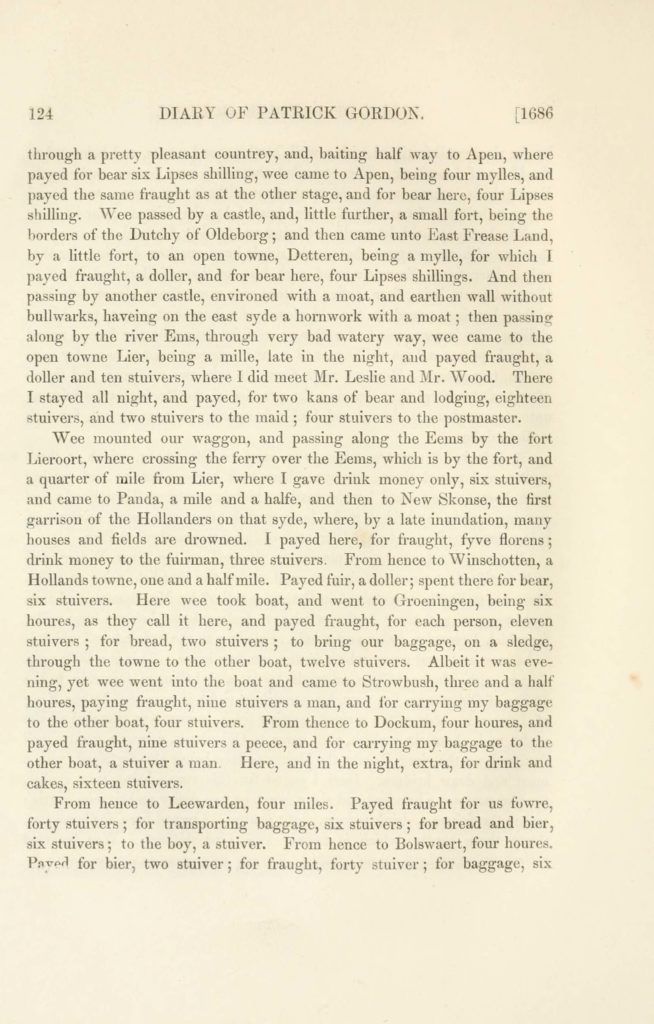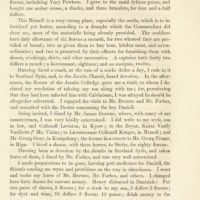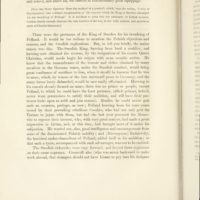
Related
![1686] DIARY OF PATRICK GORDON. 119 lages on the road, and on both sydes](https://cdn2.picryl.com/thumbnail/1699/12/31/1686-diary-of-patrick-gordon-119-lages-on-the-road-and-on-both-sydes-f65fc6-200.jpeg)
1686] DIARY OF PATRICK GORDON. 119 lages on the road, and on both sydes
![1686] DIARY OF PATRICK GORDON. 143 Gordon, and as much to the Lord Chancellour](https://cdn2.picryl.com/thumbnail/1699/12/31/1686-diary-of-patrick-gordon-143-gordon-and-as-much-to-the-lord-chancellour-180199-200.jpeg)
1686] DIARY OF PATRICK GORDON. 143 Gordon, and as much to the Lord Chancellour
![1686] DIARY OF PATRICK GORDON. 131 Htle way, and being four, wee hired a coach](https://cdn2.picryl.com/thumbnail/1699/12/31/1686-diary-of-patrick-gordon-131-htle-way-and-being-four-wee-hired-a-coach-91e62d-200.jpeg)
1686] DIARY OF PATRICK GORDON. 131 Htle way, and being four, wee hired a coach

170 DIARY OF PATRICK GORDON. [1690 delighted that he made the Boyars
![1686] DIARY OF PATRICK GORDON. 125 stuiver. From thence to Workum](https://cdn2.picryl.com/thumbnail/1699/12/31/1686-diary-of-patrick-gordon-125-stuiver-from-thence-to-workum-0ef529-200.jpeg)
1686] DIARY OF PATRICK GORDON. 125 stuiver. From thence to Workum
![1696] DIARY OF PATRICK GORDON. 185 for a just cause is rewarded](https://cdn2.picryl.com/thumbnail/1699/12/31/1696-diary-of-patrick-gordon-185-for-a-just-cause-is-rewarded-d5c23a-200.jpeg)
1696] DIARY OF PATRICK GORDON. 185 for a just cause is rewarded

116 DIARY OF PATRICK GORDON. [1686 a third, on the way to Konigsberg

20 DIARY OF PATRICK GORDON. [1655 men with a gallant traine of artillery. It was a most delighttull

138 DIARY OF PATRICK GORDON. [1686 to a coachman, to bring the trunke
124 DIARY OF PATRICK GOEDON, [1686 through a pretty pleasant countrey, and, baiting half way to Apen,
Summary
Passages from the diary of General Patrick Gordon of Auchleuchries : A.D. 1635-A.D. 1699"
124 DIARY OF PATRICK GOEDON, [1686
through a pretty pleasant countrey, and, baiting half way to Apen, where
payed for bear six Lipses shilling, wee came to Apen, being four mylles, and
payed the same fraught as at the other stage, and for bear here, four Lipses
shilling. Wee passed by a castle, and, little further, a small fort, being the
borders of the Dutchy of Oldeborg ; and then came unto East Frease Land,
by a little fort, to an open towne, Detteren, being a mylle, for which I
payed fraught, a doller, and for bear here, four Lipses shillings. And then
passing by another castle, environed with a moat, and earthen wall without
bullwarks, haveing on the east syde a hornwork with a moat ; then passing
along by the river Ems, through very bad watery way, wee came to the
open towne Lier, being a mille, late in the night, and payed fraught, a
doller and ten stuivers, where I did meet Mr. Leslie and Mr. Wood. There
I stayed all night, and payed, for two kans of bear and lodging, eighteen
stuivers, and two stuivers to the maid ; four stuivers to the postmaster.
Wee mounted our waggon, and passing along the Eems by the fort
Lieroort, where crossing the ferry over the Eems, which is by the fort, and
a quarter of mile from Lier, where I gave drink money only, six stuivers,
and came to Panda, a mile and a halfe, and then to New Skonse, the first
garrison of the Hollanders on that syde, where, by a late inundation, many
houses and fields are drowned. I payed here, for fraught, fyve florens ;
drink money to the fuirman, three stuivers. From hence to Winschotten, a
Hollands towne, one and a half mile. Payed fuir, a doller ; spent there for bear,
six stuivers. Here wee took boat, and went to Groeningen, being six
houres, as they call it here, and payed fraught, for each person, eleven
stuivers ; for bread, two stuivers ; to bring our baggage, on a sledge,
through the towne to the other boat, twelve stuivers. Albeit it was eve-
ning, yet wee went into the boat and came to Strowbush, three and a half
houres, paying fi'aught, nine stuivers a man, and for carrying my baggage
to the other boat, four stuivers. From thence to Dockum, four houres, and
payed fraught, nine stuivers a peece, and for carrying my baggage to the
other boat, a stuiver a man. Here, and in the night, extra, for drink and
cakes, sixteen stuivers.
From hence to Leewarden, four miles. Payed fraught for us fuwre,
forty stuivers ; for transporting baggage, six stuivers ; for bread and bier,
six stuivers ; to the boy, a stuiver. From hence to Bolswaert, four houres.
Pnye'1 for bier, two stuiver ; for fraught, forty stuiver ; for baggage, six
Gordon was brought up and remained a lifelong Roman Catholic, at a time when the Church was being persecuted in Scotland. At age of fifteen, he entered the Jesuit college at Braunsberg, East Prussia, then part of Poland. In 1661, after many years experiences as a soldier of fortune, he joined the Russian army under Tsar Aleksei I, and in 1665 was sent on a special mission to England. After his return, he distinguished himself in several wars against the Turks and Tatars in southern Russia. In recognition of his service he was promoted to major-general in 1678, was appointed to the high command at Kiev in 1679, and in 1683 was made lieutenant-general. In 1687 and 1689 he took part in expeditions against the Tatars in the Crimea, being made a full general. Later in 1689, a revolution broke out in Moscow, and with the troops under his command, Gordon virtually decided events in favor of Peter the Great against the Regent, Tsarevna Sophia Alekseyevna. Consequently, he was for the remainder of his life in high favor with the Tsar, who confided to him the command of his capital during his absence from Russia. In 1696, Gordon's design of a "moveable rampart" played a key role in helping the Russians take Azov. One of Gordon's convinced the Tsars to establish the first Roman Catholic church and school in Muscovy, of which he remained the main benefactor and headed the Catholic community in Russia until his death. For his services his second son James, brigadier of the Russian army, was created Count of the Holy Roman Empire in 1701. At the end of his life the Tsar, who had visited Gordon frequently during his illness, was with him when he died, and with his own hands closed his eyes. General Gordon left behind him a uniquely detailed diary of his life and times, written in English. This is preserved in manuscript in the Russian State Military Archive in Moscow. Passages from the Diary of General Patrick Gordon of Auchleuchries (1635–1699) was printed, under the editorship of Joseph Robertson, for the Spalding Club, at Aberdeen, Scotland, 1859.
